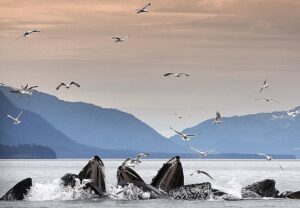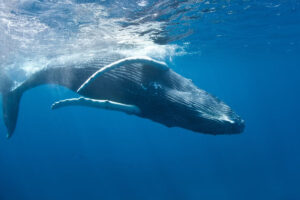Fantastic Beasts: Whale Migration and its Impact on Our Ecosystem

– Shivaan Darda

The other day I was enjoying some puns with my friends, such as, “How do whales make decisions? They flip a coin and go with the current.” This one surely got a few laughs from them.
But it got me thinking; whether whales migrating has something to do with the environment, and I was right it does have a strong impact. These majestic creatures travel thousands of miles between feeding and breeding grounds, influencing marine ecosystems and doing much more. Let me elaborate on the effect on our ecosystem here.
1.Nutrient Cycling: These fish contribute to the nutrient cycling process through a behaviour known as the “whale pump.” They feed in deep waters and defecate near the surface. This transports nutrients such as nitrogen and iron from the ocean depths to the surface. It further enhances the growth of phytoplankton, which forms the base of the marine food web. These faeces even act as a fertiliser for various marine species, from small animals to larger predators.
2.Ecosystem Structure: These enormous sea animals are apex predators and key species. Thus, their presence and behaviour influence a balanced and diverse ecosystem. For instance, they contribute to carbon sequestration. The increase in phytoplankton growth due to nutrient cycling helps absorb CO2 from the atmosphere. This effectively traps large amounts of carbon in the deep sea for centuries.

3. Marine Food Web Dynamics: By regulating prey populations, whales maintain the balance of the marine food web, preventing the overpopulation of certain species and supporting biodiversity.
Besides the puns and a fantastic natural spectacle, whale migration does play a pivotal role in the world we live in. Conservation efforts to protect and restore whale populations are therefore essential for maintaining the health of our oceans and combating climate change.